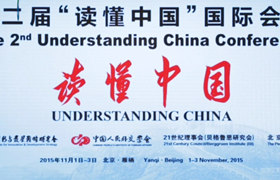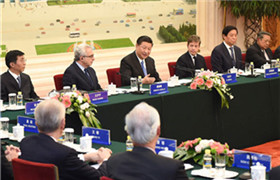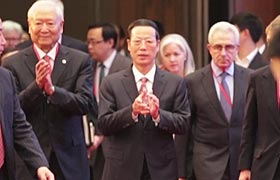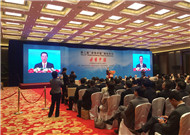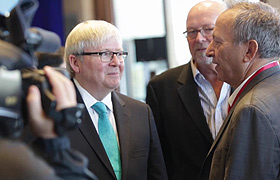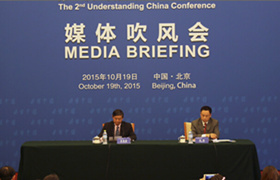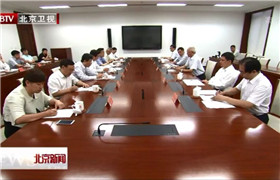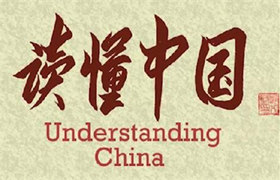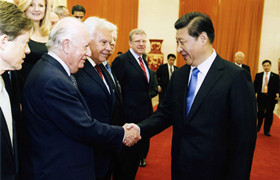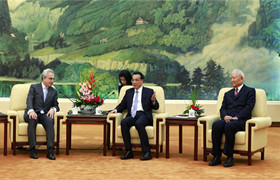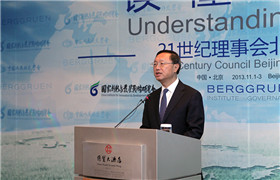- HOME--> Chairman
-
Building Communities of Interests in the Process of Peaceful Development
Source:
Zheng Bijian
Both the report of the 18th CPC Congress and the government report of the new administration have unmistakably announced that China will persevere on the path of the peaceful development, which is not only a major strategic choice of China but also her solemn declaration to the rest of the world.
Through our hard work in the past three decades since the adoption of the reform and opening up policy, China has invented a path of peaceful development which fits well the conditions of the country and is in line with the development of our times. As a result, the Chinese society is now experiencing unprecedented dynamism and vitality. China’s own growth is a great contribution to the development of the world. We have, through our actions, proved that we are a strong force for world peace and have therefore gained status and weight in the international community that we rightly deserve. This has also given us a clear and profound understanding of where we are and what to do, which, in my understanding, could be defined as the “peaceful rise” of China, a development path that is unprecedented for major countries in modern world history.
To rise peacefully implies that we must well handle our relationship with all relevant countries and regions in all directions. This is an intrinsic dimension of the peaceful rise concept. For that reason, China must gradually enlarge “convergence of interests” and build “communities of interests” in all dimensions with our neighbors and surrounding regions, as well as with all relevant countries and regions.
These concepts find their roots in the ideas and goals of development of China. The country faces a number of new challenges in its development, such as resources and environment constraints on economic growth; unbalanced economic and social development; difficult industrial restructuring and insufficient research and development capacity; human resources unable to meet the needs of employment structure; inequitable distribution of incomes and readjustment of interest structure; lagging social governance and increasing social tensions; and severe natural disasters, etc.
To meet these challenges, our work in the second decade of the 21st century will undoubtedly be concentrated on developing China’s social productive forces to a higher level, which is the ultimate basis for solving all problems in this country. In this sense, China will undoubtedly provide the rest of the world with a bigger market and greater opportunity for development. And this will determine the direction of China’s relations with the rest of the world in the next decade and beyond.
The vision of China’s peaceful rise and developing “communities of interests” are also in line with the general trends of global development. Multi-polarity and economic globalization will further increase interdependence among countries; as relations among major countries are being significantly realigned, we will see even more cooperation and competition; there is now greater momentum for the peaceful rise of developing countries as a whole including China; the international financial crisis has led to a major change in the structure of productive forces on a global scale; in the post financial crisis era, global issues such as climate change, energy security, resources, food security and financial security are becoming more acute; economic development patterns of major countries will change significantly; turbulence and geopolitical conflicts of various forms still exist; notwithstanding the changes in the global landscape, respecting sovereign right and territorial integrity are still one of the indispensable basic principles of international relationship. Looking around the world, we believe that there are both opportunities and challenges for China and the rest of the world, with the former outweighing the latter.
China will continue to follow the path of peaceful development and thus become a more important part of the world development, and China and the world will develop common interests which are better defined, more profound and more sustainable. Having harvested real benefit from the development path of peaceful rise, there is no reason that China will depart from this path. To truly realize modernization, we must continue to follow and rely on the theory of peaceful rise.
It is worth noting that expanding and deepening “convergence of interests” and building “communities of interests” is an all-directional strategic concept. In short, our goal is to combine the interest of the Chinese people and the common interest of the rest of the world, expand convergence of interests with all stakeholders in all dimensions, build communities of interests with all relevant countries and regions in different fields, at different levels and with different content, and work towards the peaceful development of both China and the rest of the world.
In fact, converging interests between China and the rest of the world have already existed. For example, China working together with other countries to meet the challenges of the international financial crisis after 2008 was the biggest converging point of interests under that particular circumstance. Right now China, the US, the EU and other major economies will need to make adjustments and conduct domestic restructuring respectively to adapt to a changing world after the international financial crisis. That should become a new area of converging interests.
China will be more determined in pursuing the development path of peaceful rise in the future. China’s decision and approach to build communities of interests with more stakeholders and in a greater number of areas will gain more extensive consensus in the international community.
-
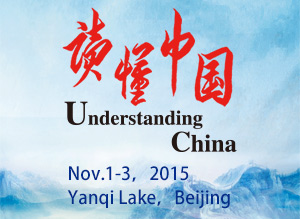
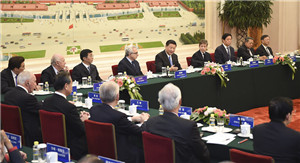
The 2nd "Understanding China" ConferenceOn November 1~3, 2015, the 2nd “Understanding China” Conference was held in Beijing Yanqi Lake International Conference Center. Zhang Gaoli, Vice Premier of the State Council, attended the opening ceremony.
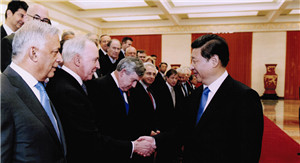
The 1st "Understanding China" ConferenceOn November 1~3, 2013, the 1st “Understanding China” Conference was held in Beijing, which was cosponsored by China Institute for Innovation & Development Strategy (CIIDS), Chinese People’s Institute of Foreign Affairs (CPIFA), and Berggruen Institute on Governance.
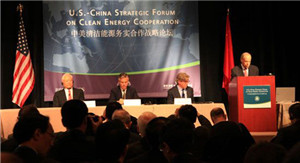
The 2nd U.S.-China Strategic Forum on Clean Energy CooperationWith the “Prospects for U.S.-China strategic cooperation in next decade” as its theme, the forum dwells on the implications of U.S.-China cooperation from the strategic perspective of coping with global challenges and maintaining world peace.
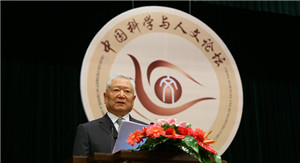
The China Sciences and Humanities ForumCo-initiated in April 2003 by renowned Chinese scientist Mr. Lu Yongxiang and influential political strategist Zhen Bijian, China Sciences and Humanities Forum was jointly hosted by Graduate University of Chinese Academy of Sciences (GUCAS) and the Higher Education Press.

